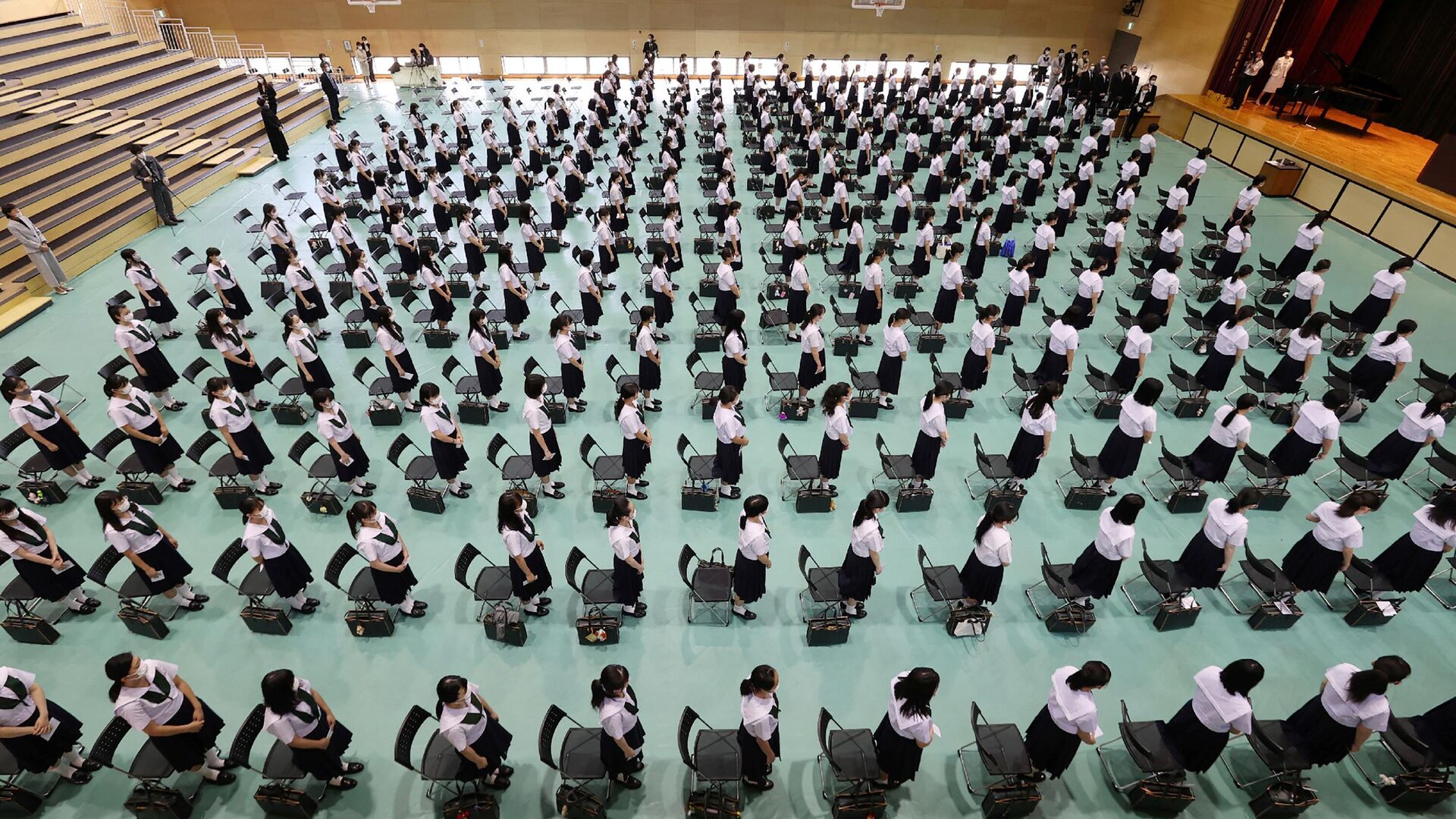Japan Bans Ponytails on Schoolgirls For Fear Of Sexually Arousing Male Peers, Media Says
13:30 GMT 11.03.2022 (Updated: 13:31 GMT 11.03.2022)

© AFP 2023 / STR
Subscribe
To say the Asian country has the strictest school rules in the world is no exaggeration. School pupils are only permitted straight, black hair. Those whose hair doesn’t "adhere" to the rules, must submit proof that it is natural and not deliberately dyed or curled.
Schools in Japan are banning girls from wearing ponytails as this style could sexually excite the schoolboys in their classes, 'Vice' reported, citing former middle school teacher, Motoki Sugiyama. The former teacher told the Canadian/American lifestyle magazine that he worked at five different schools in Shizuoka prefecture over 11 years and each of them banned the alluring hairstyle.
He said school leaders told him that a ponytail is prohibited because it exposes the nape of the neck, something officials deem would get schoolboys too excited.
He said school leaders told him that a ponytail is prohibited because it exposes the nape of the neck, something officials deem would get schoolboys too excited.
"They’re worried boys will look at girls, which is similar to the reasoning behind the white-only underwear rule. I’ve always criticised these rules, but because there’s such a lack of dissent and it’s become so normalised, pupils have no choice but to accept them," the former teacher told Vice.
Sugiyama said he had made it his personal mission to get the school rules repealed. He has a channel on social media, which stages talks about Japan’s educational system.
No One Should Stand Out
Japan has long been condemned by critics who believe its school rules (such as all-white underwear to prevent it from being visible) are too draconian. Local media has reported that some teachers checked on school pupils by pulling girls’ bra straps up or by entering a changing room where girls were dressing.
Other rules dictate the acceptable colour of socks, the shape of eyebrows and hairstyles. Students are told to have straight black hair and pupils whose hair deviates from this standard – curly or of a different tint – have to submit evidence that their hair has not been tampered with.
The number of rules and the rigour with which they are applied vary from school to school: last year, a court in the city of Osaka awarded a young woman $3,000 for emotional distress after teachers demanded she dye her hair because it was not “black enough”.
That same year, a mixed-race pupil accused officials at her school of racism after her photo in the yearbook was edited so that her hair looked black.
The strict regulations stem from the so-called philosophy of buraku kosoku, which was adopted by Japan in second half of the 19th century. According to Asao Naito, an associate professor of sociology from Meiji University, the purpose of this rigid discipline is so that no one individual should stand out. This is reportedly done to eradicate distractions and keep pupils focused on their studies.
Sugiyama stressed that the rules are irrational and have no purpose, pointing out that schools which ponytails are often perfectly happy to allow girls to have a bob hairstyle which exposes as much of the neck as a ponytail.
Naito recalls how 40 years ago, when he was in elementary and middle school, rules forbade the wearing of long skirts, which typically were used by sukeban (delinquent girls). “For that reason, long skirts were banned and made shorter. But now, schools don’t allow short skirts and are lengthening them,” he said.
In some cases, parents have managed to persuade school officials to repeal the regulations, but the majority of educational institutions still require pupils to dress according to the rules. According to 'Japan Today', 58 percent of schools in Nagasaki prefecture still require individuals to wear white underwear.
Other rules dictate the acceptable colour of socks, the shape of eyebrows and hairstyles. Students are told to have straight black hair and pupils whose hair deviates from this standard – curly or of a different tint – have to submit evidence that their hair has not been tampered with.
The number of rules and the rigour with which they are applied vary from school to school: last year, a court in the city of Osaka awarded a young woman $3,000 for emotional distress after teachers demanded she dye her hair because it was not “black enough”.
That same year, a mixed-race pupil accused officials at her school of racism after her photo in the yearbook was edited so that her hair looked black.
The strict regulations stem from the so-called philosophy of buraku kosoku, which was adopted by Japan in second half of the 19th century. According to Asao Naito, an associate professor of sociology from Meiji University, the purpose of this rigid discipline is so that no one individual should stand out. This is reportedly done to eradicate distractions and keep pupils focused on their studies.
Sugiyama stressed that the rules are irrational and have no purpose, pointing out that schools which ponytails are often perfectly happy to allow girls to have a bob hairstyle which exposes as much of the neck as a ponytail.
Naito recalls how 40 years ago, when he was in elementary and middle school, rules forbade the wearing of long skirts, which typically were used by sukeban (delinquent girls). “For that reason, long skirts were banned and made shorter. But now, schools don’t allow short skirts and are lengthening them,” he said.
In some cases, parents have managed to persuade school officials to repeal the regulations, but the majority of educational institutions still require pupils to dress according to the rules. According to 'Japan Today', 58 percent of schools in Nagasaki prefecture still require individuals to wear white underwear.




